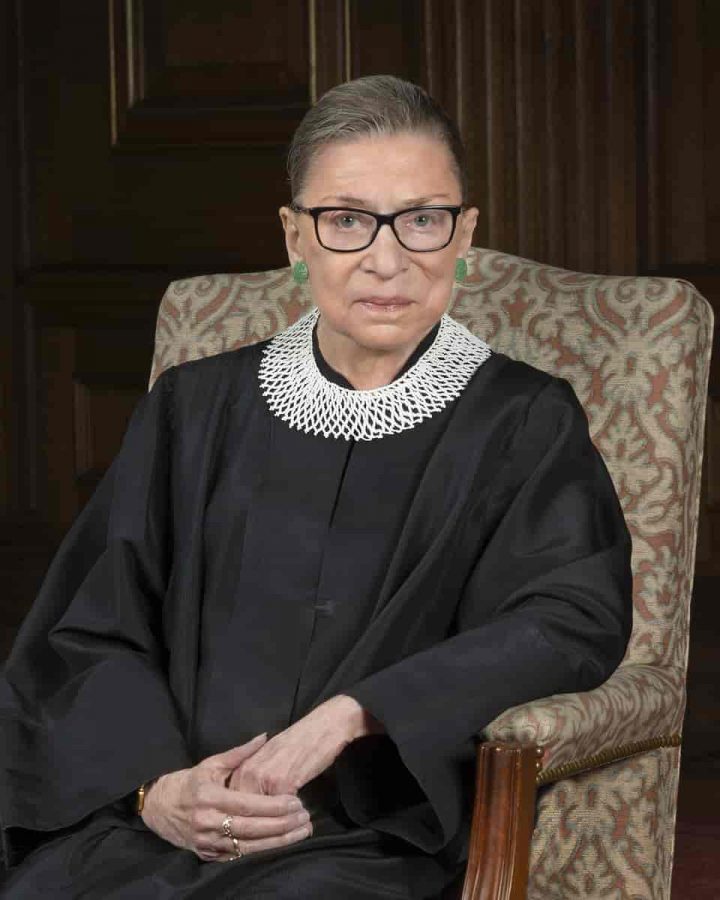Vacant seat in the Supreme Court with just 6 weeks until Election Day
September 21, 2020
Ruth Bader Ginsburg—feminist icon, social activist, preserver of justice—died from a longterm battle with metastatic pancreatic cancer at the age of 87 in her D.C. home on Friday, Sept. 18.
Representing the American people in the Supreme Court since 1993, RBG was appointed by former President Bill Clinton. Since then, she has been renowned for her advances in social and gender equality within the U.S., gaining special recognition for Supreme Court rulings: United States v. Virginia (1996), Bush v. Gore (2000), and Obergell v. Hodges (2015).
Ginsburg, having been only the second woman to serve on the Supreme Court, became notable, notorious even, for just two words: “I dissent.” This refers to the overwhelming amount of dissents she made during her time in the Supreme Court, making her a cultural icon and prominent figure in the modern-day feminist movement, eventually coining the nickname, “The Notorious RBG.”
Although RBG had a long, winding battle with cancer since 1999, the first time she missed a day on the bench was just recently, in 2019. Ultimately, the Supreme Court Justice had been physically present in court throughout and during cancer treatment for approximately 20 years, holding her commitment to the American people to the fullest, most utter extent that she could, given her medical circumstances. In 2019, as Ginsburg’s condition got increasingly worse, she missed her first oral argument as she was recovering from a lung lobectomy.
In her final days, RBG was occupied with a sense of fear for the future of our nation, voicing her concerns to her granddaughter, Clara Spera. Spera told Politico that right before her passing, RBG said, “my most fervent wish is that I will not be replaced until a new president is installed.”
Yet, President Donald Trump already announced that he does intend on bypassing a 2016 maneuver against former President Barack Obama’s nomination to the Supreme Court, Merrick Garland, following the death of former Supreme Court Justice Antonin Scalia, just nine months before the 2016 general election. At that time, Senate Majority Leader, Mitch McConnell (R) of Kentucky, claimed that the appointment of Garland was unfair because it denied voters the ability to first express their support behind one of the presidential candidates in the polls, and then, from there, have the nominee decide who should fill the vacant seat in the Supreme Court.
McConnell is receiving major backlash, from both parties, for the hypocrisy that follows his Friday announcement, stating that the upper chamber will be voting on Trump’s list of Supreme Court justice nominees in the coming days, with just six weeks until the 2020 presidential election. Trump intends to appoint a woman, he said late Friday evening following Ginsburg’s death, with Scalia’s former clerk, Amy Coney Barrett (R), at the top of that list, according to ABC officials.
Democratic presidential nominee Joe Biden seeks the same precedence that the Senate made in 2016. However, Republican Sen. Tom Cotton of Arkansas, told Newsweek they intend on following through with the nomination process, despite opposition. He also expressed complete confidence Trump will maintain the presidential seat in the coming term, implying that the appointment will be made by the Trump administration anyway, whether it be done now or after the election in November.
One way to pay respect to late Supreme Court Justice, Ruth Bader Ginsburg, is to honor her wish and seek fairness in the upcoming nomination for her now vacant seat. Contact your representatives by texting “RESIST” to 50409, to hold the SCOTUS nomination after the upcoming inauguration.





















MP • Sep 23, 2020 at 12:30 pm
I think it is important that regardless of what is being said about the court being able to “handle business” until after the election , I also see it as being important that the new judge be appointed before the election since Joe Biden has promised that if does not win the election, that he will take it to court. It was also very convenient that Ruth Ginsburg was being kept on ventilators and other forms of life support until this point, its too bad they couldn’t have removed everything after the election.